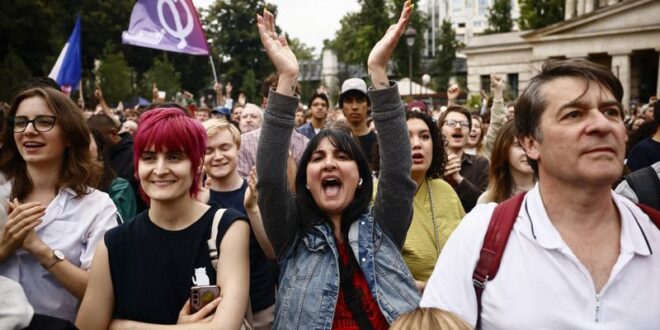LONDON (Reuters) – France’s left-wing New Popular Front coalition won the most seats in the second voting round of parliamentary elections, leading pollsters said on Sunday.
That puts them on track for a surprise win over the far right National Rally (RN) party but short of an absolute majority in parliament.
COMMENTS:
SIMON HARVEY, HEAD OF FX ANALYSIS, MONEX EUROPE, LONDON:
“It looks like the anti-far right parties really got a lot of support. But fundamentally from a market perspective, there’s no difference in terms of the outcome. There’s really going to be a vacuum when it comes to France’s legislative ability.”
“The bond market is going to be the real place to look at. There might be a bit of a gap lower in French bonds (prices).”
“We’re in for a period of policymaking not being able to do anything sizeable. Really and truly the reaction should be minimal. If we do see one it will be towards higher yields, lower euro and lower French stocks.”
“The real question is who’s going to be running and who’s going to be the next prime minister.
“We’re not going to see much in terms of fiscal policy.”
HOLGER SCHMIEDING, CHIEF ECONOMIST, BERENBERG, LONDON:
“This (projected result) is a serious relief for Europe as the euroscpetic far-right appear to have done far less well than expected.”
“The tail risks have been avoided. The left Alliance, although strong is not close to a majority and (Marine) Le Pen is far behind, far away from the majority.”
“Still, it will be difficult for France to form a government and as the most likely potential outcome is now some arrangement between parts of the left and (President Emmanuel) Macron. That will likely mean that Macron has to shift and the left will be able to have some influence on policy.
“This could mean some reform reversals rather than further reforms. The outcome I would say is less bad than could have been the case. It could have been much worse.”
“For markets, basically the tail risks have been avoided. And although the left has unaffordable spending plans, the left will need allies and will only be able to implement some of their promises.”
JAN VON GERICH, CHIEF MARKET ANALYST, NORDEA, HELSINKI:
“While the initial French election results still raise many questions, financial markets are likely to greet the vote with some relief. The results appear to show that the more moderate forces still ally in the second round against more extreme candidates, which also has repercussions for the next presidential election.”
“That said, the economic programme of the left is in many ways much more problematic than that of the right, and while the left will not be able to govern on their own, the outlook for French public finances deteriorates further with these results. It is thus reasonable to expect somewhat higher risk premia in French assets to prevail also beyond the initial market reaction.”
BEN LAIDLER, HEAD OF EQUITY STRATEGY, BRADESCO BBI, LONDON:
“There’s obviously going to be a little bit of relief that the far right fell short much more than expected but we’re still left with an uncomfortable surprise of the left wing doing much better than expected.”
“That’s going to probably bring an end to this tentative euro and French stocks rally we’ve seen over the last couple of days. It represents more uncertainty from an angle that markets had maybe taken their eye off.”
“One caveat though is that a big slug of this euro rally had nothing to do with what was going on in France. It had a lot to do with the dollar weakening on clearer signs of the U.S. economy slowing.”
“That’s going to take a little bit of time to digest. But this is going to be a hung parliament. There’s going to be limited ability for anybody to be able to do too much.”
(Reporting by Dhara Ranasinghe and Harry Robertson; Editing by Elisa Martinuzzi)
 BeritaKini.biz Berita Viral Terkini di Malaysia
BeritaKini.biz Berita Viral Terkini di Malaysia





